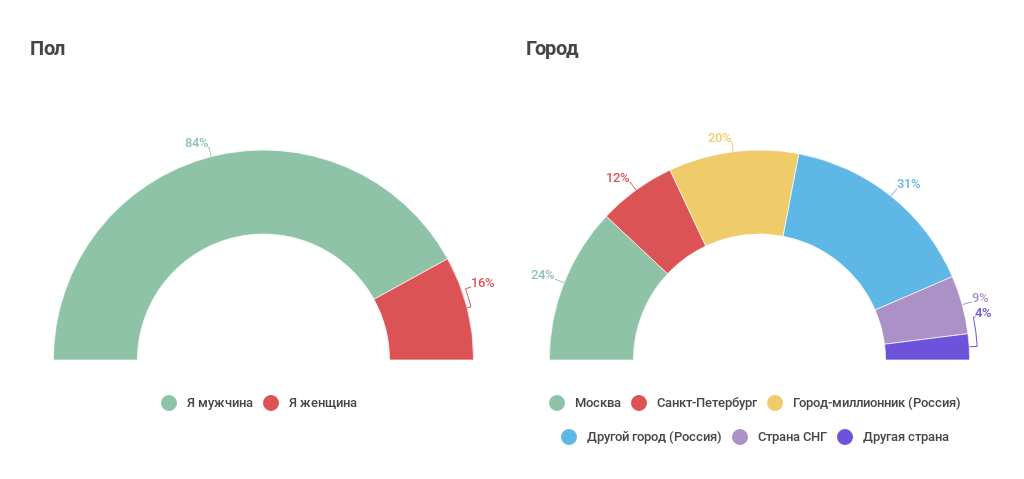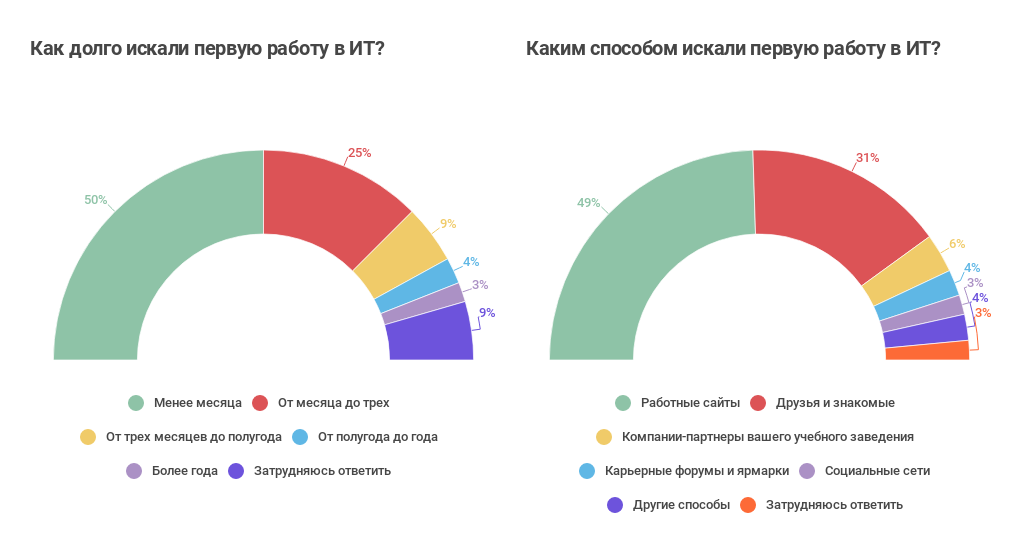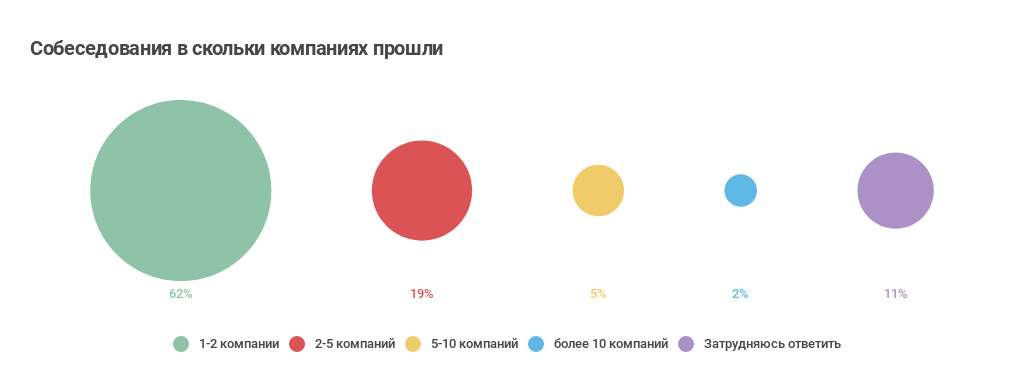How come to IT: about the interns and the June (the result of a survey of "My Circle")

Some time ago, “My Circle” took part in a discussion organized by our friends from Index School and dedicated to the employment of beginner specialists. The organizers set the following problem for the participants of the meeting:
“The IT industry has long lacked professionals, and this is not new to anyone. It would seem that emerging specialists who are well-off in the market should be the way out of this situation. In reality, employers are often not ready to take the June, continuing the endless search for the very "strong middle." Add to this the problem of “age-related” juni: the chance to find a good job for those who came to the industry after 35 years is almost zero. Each company tries to solve this problem in its own way, but the situation on the market suggests that all these steps cannot yet have any significant effect on the overall balance of power. ”
The discussion turned out to be lively, and even more sharpened the questions posed. We decided to explore the topic of novice IT specialists in more depth and conducted a survey among users of “Habr” and “My Circle”. We collected more than 2,000 responses, visualized them with diagrams and today are happy to share the results.
From the report you will know at least the following
- Almost half of those who come to IT for the first time are still studying in universities.
- One third of specialists come to IT from completely different spheres, and most of them come not from a bad life, but by the vocation of the soul.
- Almost half of newbies change their first IT specialization over time.
- In the course of time, the capital cities take for themselves a part of specialists grown in the regions, and large private companies are specialists grown in small private or state-owned companies.
- In the all-Russian market of beginner specialists, the capital cities make the greatest contribution to analytics, Eychar and sales; regional - in administration, fulstak and mobile development; millionaires - in marketing.
- 50% of novice specialists find their first job in IT in less than a month, 62% are interviewed in only 1-2 companies.
- Approximately 50% of novice professionals find work through work sites, and about 30% more - through friends and acquaintances.
- 60% of beginners start a career in IT from the perspective of a novice specialist (junior), 33% from the position of an intern, paid internships are twice as much as unpaid ones.
- 75% of interns and 85% of juniors work in their first company for more than half a year, almost half of newbies change their first IT specialization to another over time.
- 60% of companies do not have any adaptation mechanisms for beginners, 40% do not have any programs to attract them, and 20% do not work with trainees and junies at all.
- The main risk of working with beginners is that most companies see the difficulty of assessing the potential of a future employee.
- When applying for their first job, newbies underestimate the importance of soft skills, which the employer puts even higher technical knowledge.
- Although 60% of companies claim that they do not pay attention to the beginner's age, the other 20% say they do not take candidates older than a certain age to the position of a novice specialist.
Who participated in the survey
First, let's see who exactly participated in the survey in order to understand the context in which we will interpret the answers. It turned out about the same sample as in all of our past surveys.
Two thirds of respondents are developers. The only difference is that this time more junior and trainees participated in the survey. Usually, they make up a quarter of all respondents, and now there are more than a third of them.

As always, there are five men for every woman, every third out of a non-million city, every fifth out of a million, every fourth is from Moscow, every tenth is from St. Petersburg.

Most work in small private companies, every tenth is temporarily not working. This time, slightly less freelancers and slightly more employees of large private companies than usual participated in the survey.

When you came to work in IT, was this your first job?
It is curious that more than a third of specialists coming to IT for the first time come here from other non-IT fields of activity. Among those who come to HRP, management, sales and content - more than half of them. Among those who come to the game and desktop development - only one-fifth of them.

Of the other areas of activity in IT comes the most engineers, managers, vendors, workers, technicians and teachers.

It turned out that from other areas IT is not coming from a bad life, but by the vocation of the soul. For 58%, the main reason for retraining is the interest in the IT sector as such. Only 30% and 28% respectively indicated a financial cause or problem with career growth in the previous work. Only 8% indicated the problem of finding a job in their previous profession.
Almost 20% noted the possibility of remote work as the reason for choosing IT.

What is your education and its completeness when you first work in IT?
As we learned from past research , 85% of IT professionals have a university degree. Of these, 59% have a profile for IT education, 19% have a non-core technical education, and 12% have a non-core humanitarian education.
The share of "humanities" is most of all in the same Euchar, sales, management and content, as well as in design and marketing. Least of all, their share in the desktop, fullstak and backend development, as well as in telecommunications. The share of "techies" with non-core IT education is most in marketing and testing.

At the time of the first job in IT, only 33% of specialists have completed higher education, 45% are still studying at the university. Of those who come to HRC, analytics, testing and management, more than half have already completed their studies. Of those who come to game development and full stack development, as well as marketing, more than half are still studying.
In sales and administration, the highest proportion of newcomers have no higher education and no students in universities, and in analytics and management it is the smallest. In sales, the highest proportion of students.

In administration, game development and design, the average median age of joining IT is 20 years, in management - 23 years, and in Euchar - 25 years. In other specialties - 21-22 years.

Has your specialization changed since you first worked in IT?
We compared the answers to two independent questions, “what is your current specialization” and “what is your first specialization” in IT? And got a curious diagram. It can be seen that over time, the proportion of those working in backend and fulstak development increases noticeably, and the proportion initially working in desktop development, administration and support decreases.
This reflects the re-qualification process for newbies inside the IT industry.

On average, every second changes its first specialization in IT.
If you look at each specialization separately, you will see that more than others, more than two-thirds, change their specialization, if they initially came to the desktop development, telecommunications, support, marketing, sales or content. Less often than others, less than a third change their specialization if they first came to Eychar or mobile development, as well as management or front-end development.

In which city and in which specialty was your first job in IT?
As in the case of the change of specialization, we see the change of the region from the moment of the first work in IT. Over time, the proportion working in Moscow and St. Petersburg noticeably increases, and the proportion working in a non-million city falls. Capital cities take away some of the specialists who were grown up last.
This shows the internal migration of IT professionals.

For each specialty, we see a more curious picture. Moscow and St. Petersburg give the largest shares among newcomers to analytics, aychare and sales; and the smallest in game development, administration, full-stack and mobile development. In the non-million cities, the opposite is true: the largest shares among newcomers are in administration, full-stack and mobile development; and the smallest - in analytics, aychare and sales. The million-plus cities by beginners make the biggest contribution to marketing, management and sales.
There is a division of labor between the capitals and regions: technical specialists in the regions, managers in the capital.

In which company and in which position did you start working in IT?
As in the case of a change of specialization or a city since the moment of the first job, a similar picture is observed with the change of company. Over time, the share of employees in large private companies increases markedly and the share of employees in small private and public companies falls. Large private companies are taking away some of the professionals that they have raised.
58% of newbies start in IT from the perspective of a novice specialist (Junior), 34% from the position of an intern. Paid internships are almost two times more than unpaid ones.

The higher the starting qualification of a novice, the longer, on average, he works until his first promotion. 66% of unpaid interns, 52% of paid interns, and only 26% of juniors work less than half a year before the first increase.
About half of each group has to work in their first company for more than half a year.

How long and in what ways have you been looking for your first job in IT?
50% of beginning specialists find their first job in IT in less than a month, another 25% spend no more than three months on it. Approximately 50% find work through work sites, 30% through friends and acquaintances.

62% of novice specialists are interviewed in 1-2 companies and find their first job. Another 19% are interviewed in no more than 5 companies.

What do you think, what qualities do you need to be hired?
The vast majority of both novice applicants and their employers consider basic technical knowledge, soft skills and the ability to pass a test task to be the most significant when applying for a job.
However, newcomers somewhat underestimate the role of soft skills: for an employer, their importance is even slightly higher than technical skills. Beginners should also pay more attention to their educational and personal achievements: employers value such achievements far more than their ability to solve logical problems.
It is curious that the presence of specialized education is of not very high importance for both parties.

How was the adaptation process arranged, what difficulties did you encounter?
66% of beginners signal that they did not see any adaptation process in the company. Only 27% had a personal mentor, and another 3% had courses. Accordingly, newcomers see the main problem of adaptation as a lack of proper attention to them.

However, despite the difficulties voiced, 61% of specialists estimate their first IT experience as positive and only 8% as negative.

If you have an interesting story about your first job in IT?
- It was the first job in my life, and I was so afraid of everything that I didn’t go to dinner for the first month during the working day (although I wanted to) because I thought that I should always be in the workplace and work tirelessly :)
- Yes, the teacher thought that I was developing mobile applications, and I was developing desktop applications, they called me to practice, they gave me a difficult task, and then I really had to learn mobile development.
- The first day of work and the first project on the front - 10 days, 20 pages of online store layouts - but I do not know how the div differs from the span. I managed, I did a great job, the project is still online, and its code is better than that of some large projects that I met in Moscow.
- My first order was from a foreigner, and I wrote him a $ 200 curve: D
- I slept at work, instead of a pillow there was a system unit. And literally dropped the server, it was fun to call and explain to the authorities: the server fell, but it works;)
- In the first working week I accidentally deleted ~ 400GB of data! Then everything was restored.
- After leaving the largest (in its branch) enterprise in the region, a 40-year-old driver was put in my place (admin linux, oracle DBA).
- The phrase of the director “write something that can be sold” is brilliant!
- I came for an interview, did not know the necessary PL, passed the test on the other, gave 2 weeks to learn the required PL. On the first day I go to work, they ask me: “Where have we hired you Backend, or Frontend?” And I don’t remember and don’t understand much of a difference, I answered - the backend, so now I write.
- The first time I saw Macbook live at work: D (iOS developer).
- Once they were given a prize in the form of 1GB flash drives for extra-hour work on New Year's Eve. Well, I found my wife in the first place of work, in the next department.
- The shortest interview in my life: “Did you work with COM ports? - Not. - Will you? - I will".
- I came from the position of a journalist to the vacancy of a content manager in IT. After a couple of months, they offered to stay with the project while the colleague was on vacation. A year later, he was promoted to the head of the IT department, a year later to the commercial director. Rapid career growth :)
If you have a similar interesting story, share it in the comments!
You recruit interns and juniors, how do you work with them?
Further, we asked whether the respondent participates in the selection of personnel, and further questions were addressed only to those who participate.
It turned out that in 18% of companies do not work with novice specialists in general. In other cases, juniors are taken twice as often as trainees.
Nearly 40% of companies have no special programs for attracting and adapting newbies. In 38% of newbies, mentors adapt. In 31% of cases, companies cooperate with universities or they have an internship system. 15% of companies have their own training courses (schools).

The main risk of working with a novice specialist is the difficulty of assessing its potential, 55% noted this. In second place are the risks associated with trusting a beginner in tasks and the complexity of his adaptation, 40% and 39%, respectively. In third place is the risk of leaving a new specialist to another company, 32%.

What age is an obstacle to take a candidate as an intern or junior?
60% say they do not pay attention to the beginner's age. However, the other 20% say that they do not take in newcomers candidates over a certain age.

In 40% of cases, for beginners at the age of the same expectations as for the rest of the beginners. But in about 35-40% of cases such specialists expect good soft skills, independence and high motivation.
In half of the cases, newcomers are expected to take the same risks as other beginners. But in 30% of cases they believe that such specialists have an inflexible mind, in 24% they see the problem in the complexity of managing them, in about 15% of cases they believe that there will be problems with pouring into the young team and the overall speed of the team.

Despite the fact that the majority believes that age is not an obstacle for a beginner, 52% agree that it is more difficult for a person in the age to find a job as a novice than a graduate of a university.

Were there any successful case studies in your practice for a candidate over 35 years old as an intern or junior?
- One of the android developers at my first job was just a 35+ junior, although before that he worked in a printing house, i.e. in an area far from being developed. Now he has moved to permanent residence in Europe, has successfully settled and is one of the frequent participants of various conferences on android-development.
“A person has studied chemistry and taught other students all his life, he started writing code in 40+, almost 65 still works at his own age, a senior developer.
- In the next division, the associate professor of mathematics began his career as a junior developer of 3D games in 40+ years.
- Now a man sits in front of me, over 40. He came to us like me, from admins. He started from the junior position. Quickly joined the general stream. Now this is a strong middleware developer.
- A guy came, about 35-40 who had independently studied Java, Android at home and wrote an educational project. I wrote first under the guidance, then independently application for the Car Sharing service.
- We have an average age in the company of 27 years. Somehow I got a test task (for some reason outside the general line, that is, without a resume) and it turned out to be very soundly fulfilled. They called me without looking - so much was allocated from the rest to the junior position. It was a surprise to meet and interview a 40-year-old man for such a position, given the fact that he knew PHP for a month and the total IT background was no more than 1 year old. Caught on.
- Our tester is 40+, they took him because he is a science fiction writer and a good visionary, and besides, IT has fired up and tested, and besides it has a great expertise in construction, and this is our market.
- I came as a newcomer from another company, at the age of 40, after half a year I rose to the middle of the developer frontend, in another half a year I moved up to the team lead.
- Working at the tractor factory, a man made games on Flash and successfully sold them. Nobody taught him, because of his age, it was hard for him to join, but as a specialist he showed himself worthily.
If you have a similar interesting story, share it in the comments!
